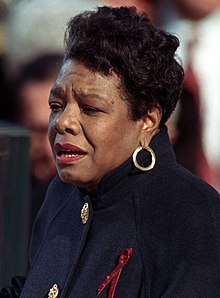Maya Angelou: A Literary Luminary and Civil Rights Champion

As March unfolds and Women’s History Month takes center stage, it’s fitting to shine a spotlight on the incomparable Maya Angelou—a woman whose indelible mark on literature and civil rights activism continues to resonate with audiences worldwide.
Born Marguerite Annie Johnson on April 4, 1928, in St. Louis, Missouri, Maya Angelou’s early life was marked by hardship and adversity. Raised in the racially segregated South, she experienced firsthand the pervasive injustices of discrimination and inequality. Despite the challenges she faced, Angelou’s indomitable spirit and passion for storytelling served as the foundation for her remarkable journey.
Angelou’s literary career began in the 1950s, during which she explored various creative avenues, including acting, singing, and dancing. However, it was her groundbreaking memoir, “I Know Why the Caged Bird Sings,” published in 1969, that catapulted her to literary stardom and cemented her status as one of the most influential voices of her generation. The memoir, which chronicled her experiences growing up in the Jim Crow South, became an instant classic, earning widespread acclaim for its raw honesty and poignant portrayal of resilience in the face of adversity.
Throughout her life, Maya Angelou remained a steadfast advocate for civil rights and social justice. Her activism was deeply rooted in her own experiences of racism and discrimination, and she used her platform to shine a light on the systemic injustices faced by African Americans. Her unwavering commitment to equality and justice was evident in her poetry, essays, and speeches, which challenged the status quo and inspired countless individuals to take action against oppression.
One of Angelou’s most iconic works, her poem “Still I Rise,” encapsulated her unwavering spirit and resilience in the face of adversity. With its empowering message of self-love and defiance, the poem became a rallying cry for marginalized communities around the world, inspiring generations to stand tall in the face of oppression.
While Maya Angelou’s impact on literature and culture is undeniable, her influence extended far beyond the realm of art. Her activism and advocacy helped to catalyze social change and pave the way for greater equality and justice. Although specific laws may not have been changed directly because of her, Angelou’s contributions to the civil rights movement undoubtedly played a significant role in raising awareness and mobilizing support for legislative reforms.
As we celebrate Women’s History Month, let us honor the enduring legacy of Maya Angelou—a woman whose words continue to inspire, uplift, and empower us all. May her life serve as a reminder of the power of resilience, the importance of speaking truth to power, and the enduring quest for justice and equality for all.
Sign up for Kristy's Newsletter!
Get all the updates on upcoming books and events!
